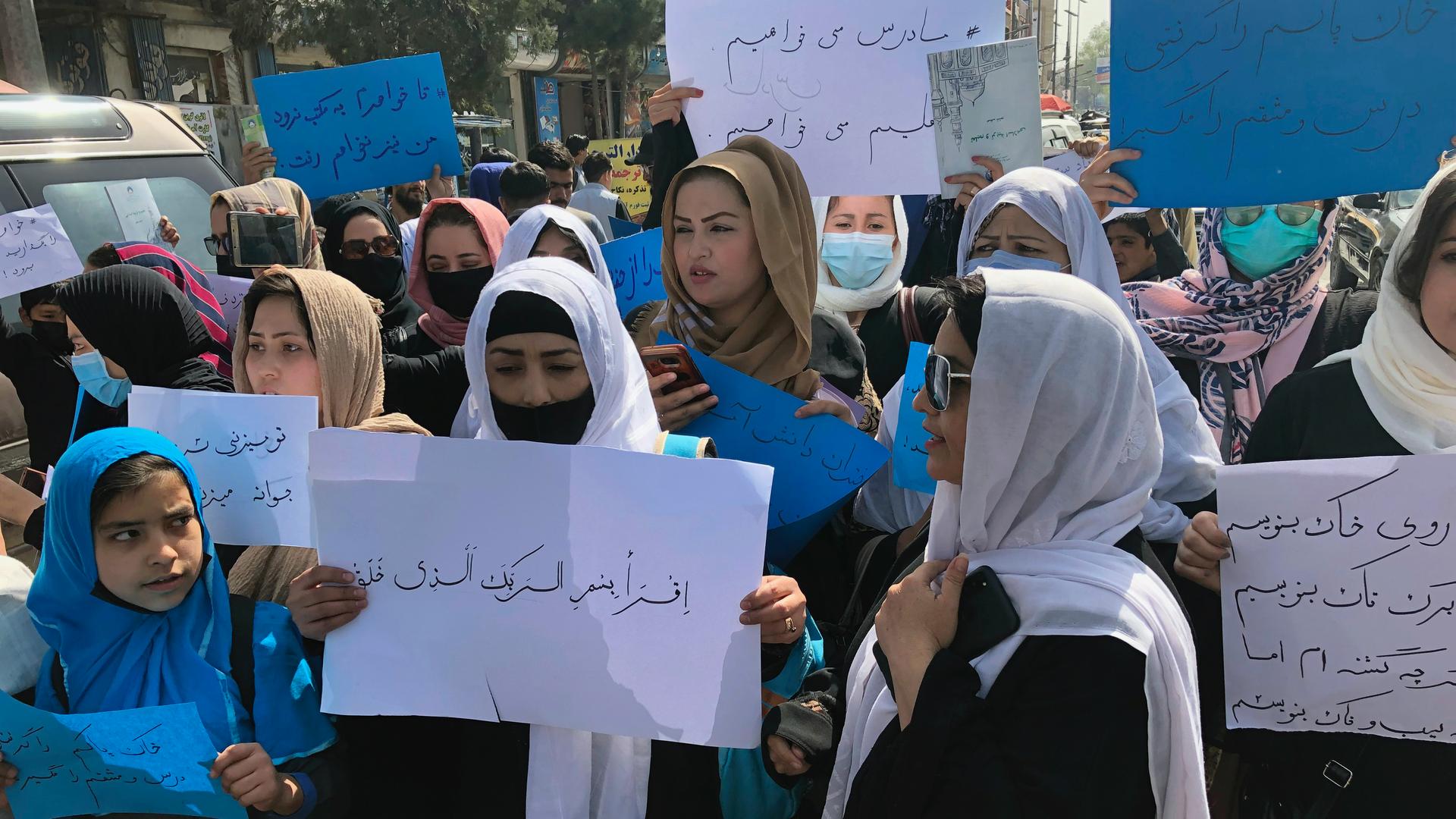The day the Taliban took over Afghanistan almost two years ago, Farzanah Ayubi was giving a speech in Kabul.
When she heard the news, she decided to finish the speech. The audience stayed, too.
“I won’t ever forget that moment,” Ayubi said.
Afterward, she said, she stepped outside into what felt like a very different city. There was chaos and panic. She couldn’t find a taxi. It took her five hours to get home — a journey that would typically take 20 minutes.
Since that day, the Taliban have imposed on women one restriction after another. The latest came in December, when they banned women from working for nongovernmental organizations. Thousands of women lost their jobs overnight. The months since, women NGO workers say, have been among the most difficult.
Agencies have been pressuring the Taliban to reverse course, and on Thursday, the head of a major aid organization said that the Taliban have agreed to consider allowing Afghan women to resume work at the agency in the southern province of Kandahar, the religious and political center for the country’s rulers.
Jan Egeland, the secretary-general of the Norwegian Refugee Council, met officials in the capital Kabul and in Kandahar to persuade them to reverse the ban on the organization’s female staff.
“We have an agreement to start immediate talks on a temporary arrangement that will enable our female colleagues to work with and for women and others in Kandahar,” Egeland told The Associated Press. “If we get a provincial exemption in Kandahar, we should be able to replicate it elsewhere.”
In January, the Taliban said they were working on guidelines for women to return to work at NGOs. Egeland said earlier this week that key officials told him they are close to finalizing these guidelines. But they were unable to give a timeline or details.
Mission to ‘liberate’ Afghan women
Ayubi’s NGO, which helped low-income women get better access to health care and education, was shut down and her team was sent home.
“[The Taliban] told us if we don’t shut down, we’ll face problems,” Ayubi said.
Next, she received threats and had to leave the country, first to Pakistan and then to Canada.
Today, she’s trying to resume her work once again, but it’s hard to do so from afar — and without her employees, she said.
For many women, the situation is reminiscent of Taliban rule in the past.
During the early days of the US-led invasion of Afghanistan, one justification given by the Bush administration was to “liberate” Afghan women.
“Because of our recent military gains in much of Afghanistan, women are no longer imprisoned in their homes,” first lady Laura Bush said in a radio address four days after the fall of Kabul in 2001. “The fight against terrorism is also a fight for the rights and dignity of women.”
More than two decades later, Afghan women like Diba Farahmand, who used to run an NGO called Women Empowerment, are once again being confined in their homes.
Farahmand employed 73 people, mostly women. Now, she said, she has no job and no income. For years, Farahmand said, she helped Afghan women in need. Now, she needs help herself.
“My former employees call me in tears,” she said from Kabul. “They say their kids are going to bed hungry. They’re desperate, and I don’t know what to tell them.”
The Taliban’s ban on women’s employment could not have come at a worse time. Afghanistan is facing a devastating humanitarian crisis. After the fall of the Afghan government, direct international aid to the country stopped.
Two-thirds of Afghanistan’s population need urgent aid in order to survive, according to the UN’s Office for the Coordination of Humanitarian Affairs.
Witnesses say the aid that does get into the country is not being distributed fairly.
“The distribution system is male-dominated, so, many women are simply left out,” explained Shamail Tawana Nasiri, who conducted an informal survey in parts of Afghanistan recently.
American officials have also raised questions.
Last month, the head of the Special Inspector General for Afghanistan Reconstruction, John Sopko, spoke on Capitol Hill and complained about a lack of transparency.
“Unfortunately, as I sit here today, I cannot assure this committee or the American taxpayer we are not currently funding the Taliban. Nor can I assure you that the Taliban are not diverting the money we are sending from the intended recipients,” he said.
The Biden administration said it has systems in place to make sure aid is getting to those who need it.
A Taliban spokesperson did not respond to questions about aid distribution.
But Afghan women continue to fight back. They have started underground movements and organized protests.
Nasiri in Kabul said that protesters are using a range of tactics to avoid getting caught. She said they change locations for protests at the last minute, when leaving the gathering, they switch outfits so they are not easily identified, and they don’t return home immediately.
“The women are scared,” Nasiri said. “Many have stopped coming to protests because of the Taliban crackdown.”
But, she added, “we have to speak up for ourselves. Because if we don’t, no one else will.”
